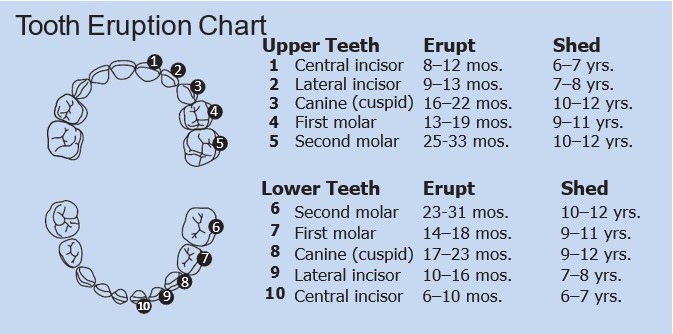A Baby's First Tooth
A baby's first tooth is an important milestone.

Teething Can Be Unpleasant
Baby teeth, also called primary teeth, usually start to appear between the ages of six months and one year. As the new teeth erupt or appear in the mouth, babies may have sore or tender gums that can cause them to be irritable and fussy. They may experience other unpleasant symptoms such as loss of appetite, sleeplessness, and excessive drooling. While teething, it is not normal for them to have diarrhea, a fever, or a rash. If you notice these conditions in your teething baby, you should consult your doctor.
The side effects of teething, which can make a baby uncomfortable, can also be unpleasant for parents as some extra time and patience may be required to comfort the infant. To help soothe a baby with irritated gums:
- Try to give them a clean teething ring to chew on.
- Gently rub their gums with a small, cool spoon or a wet, cool clean washcloth.
- Rub their gums gently with a clean finger or wet gauze pad.
If discomfort continues or seems excessive, parents should consult their dentist or pediatrician.
The Importance of Baby Teeth
Although the process of teething can be a bit unpleasant, those tiny new teeth can play an important role in your baby's healthy development. Even though they eventually fall out and are replaced, baby teeth are just as important as adult permanent teeth.
- Primary (baby) teeth help children chew their food and speak properly.
- Healthy baby teeth also help keep a space in the jaw for permanent adult teeth.
- If a baby tooth is lost too early, crowding and misalignment may occur when it is time for the adult teeth to emerge (come in). This could result in crooked teeth and could require more complicated or expensive treatment as your child gets older.
When Will the Teeth Appear?
Newborn babies typically have a partially developed set of teeth that are not yet visible. Parents will usually start to see their baby's first teeth erupt or appear in the mouth between six months and one year of age. Although, in some cases, baby teeth may already be visible when a baby is first born.
The first teeth to erupt or appear in the mouth are usually the two bottom front teeth, called the central incisors, at between six and ten months of age. These are usually followed by the appearance of the four upper front teeth, the central and lateral incisors.
Typically, the lower lateral incisors will appear next. After a baby's first birthday, the first molars may begin to appear, followed by the canine (cuspid) teeth and the second molars. Although the rate and timing of when teeth begin to show may vary, by the time a child is three years old, all 20 of the primary teeth have usually erupted. Children typically keep all of their baby teeth until around the age of six years when they will begin to fall out and the permanent teeth begin to replace them.

Keep Those New Teeth Healthy
Baby teeth are susceptible to decay as soon as they appear, so special care should be taken to keep them healthy. Tooth decay that occurs in infants is called baby bottle tooth decay or early childhood caries. This occurs when baby teeth are frequently exposed to liquids containing sugar.
Among these liquids are milk, formula, fruit juice, sodas, and other sweetened drinks. An increased risk of tooth decay is also associated with on-demand nighttime breastfeeding after eruption of the child's first tooth, and with the use of pacifiers that are frequently dipped in honey, sugar or syrup. When young children are allowed to drink sugary liquids from a bottle or sippy cup, the sugars can pool around the teeth and gums and feed the bacteria that cause decay. Unfortunately, by the time you notice signs of decay in baby teeth, it may be too late to save them.
For babies who are born prematurely, you may want to pay special attention to when the baby teeth begin to erupt. Some premature and low birth weight babies have dental complications. Changes may occur to the bony structure of the upper part of your child's mouth as a result of an intubation tube. In addition, they could have enamel hypoplasia or "preemie teeth." This condition can cause the teeth to look brownish and be more prone to decay. Premature babies may also experience delays in the appearance of their baby teeth. Parents of a prematurely born baby may want to talk to their dentist as soon as the first baby tooth erupts to help prevent any complications.
Prevent Early Childhood Caries
- Do not allow your baby to fall asleep with a bottle containing sugary liquids, juice, formula or milk, or provide on demand nighttime breastfeeding after the eruption of the child's first tooth.
- If your child needs a pacifier, use one recommended by your dentist or physician. Never give your baby a pacifier dipped in honey or another sweet liquid.
- Wipe your baby's gums gently with a clean gauze pad or washcloth after As soon as a child's first tooth appears, it is recommended you begin brushing with a soft infant toothbrush.
- Consult a dentist or healthcare provider before introducing a child under two years old to fluoride toothpaste. For children ages 2-6, use a pea-sized amount of fluoride toothpaste on the toothbrush. You should help brush the child's teeth (recommended particularly for preschool-aged children) or supervise tooth brushing and encourage the child to spit excess toothpaste into the sink to reduce the amount of fluoride swallowed.
- Flossing should begin when there are two teeth in the mouth that touch each other. You can help floss your child's teeth until they are able to floss by themselves.
- Continue to clean and massage gums in areas where teeth have not yet emerged.
- If you use reconstituted infant formula from powdered or liquid concentrate, as the primary source of nutrition for infants, be aware that the fluoride content in bottled water varies. If you are preparing formula reconstituted with water that contains fluoride, there may be an increased risk for your child's tooth enamel to appear with mild dental fluorises if the formula is your child's main source of food. Mild fluorosis appears as small very white areas scatter over the tooth which are strictly cosmetic in nature. To reduce this possibility, consider using low-fluoride bottled water some of the time. These are typically labeled as "distilled," "deionized," "demineralized" or "purified". This is the easiest way to ensure that infants do not exceed the National Academies of Sciences, Engineering and Medicine's recommended daily intake of fluoride.
- If your local water supply does not contain enough fluoride, ask your physician or dentist if your child needs additional fluoride and how your child should get it. The Centers for Disease Control and Prevention has identified the optimum level of fluoride in community water supplies as 0.7 milligrams per liter of water; to prevent decay. To find out the fluoride level of your water, contact your local water utility. If you have well water, contact your local health department, and inquire if they have a program which provides a test kit or resources for obtaining one.
- Encourage children to drink from a cup by the time they reach their first birthday.
- Schedule a visit to the dentist by your child's first birthday to find any early dental problems and to establish a good oral care routine
Although teething can be a difficult phase of your baby's life, it is the first step toward a beautiful smile that can bring joy for years to come. You can use baby teeth as a way to start teaching a young child about good oral care, which will help give them a healthy smile for a lifetime.
Note: The information in this document is not meant to replace the advice of your dentist or another licensed healthcare professional. Talk to your dentist for any specific dental advice.
Sources: American Academy of Pediatric Dentistry: www.aapd.org American Dental Association: www.ada.org Academy of General Dentistry: www.agd.org National Institute of Health: https://ods.od.nih.gov/factsheets/Fluoride-HealthProfessional/ Centers for Disease Control and Prevention: https://www.cdc.gov/fluoridation/faqs/public-service-recommendations.html https://nccd.cdc.gov/DOH_MWF/Default/AboutMWF.aspx






